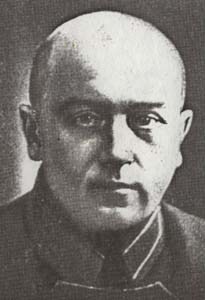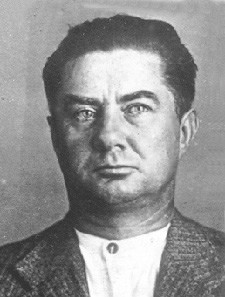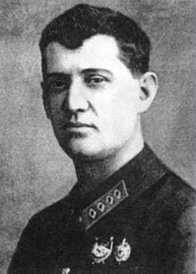 W
WSaul Amsterdam, also known as Gustaw Henrykowski, was a Polish communist activist, a lawyer by profession. Initially, a member of the Poale Zion 1918–1921, and from 1923, a member of the Central Committee of the Communist Party of Poland (KPP). Between 1933-1934 Amsterdam was a member of the Politburo of the Central Committee of the KPP. He also was a journalist and involved in the activities of the Communist International.
 W
WStanisław Feliks Bobiński was a Soviet communist politician, journalist and military commander of Polish origin. Born November 20, 1882 in Warsaw to a gentry family. In 1910 he graduated from the faculty of philosophy of the Jagiellonian University of Kraków. He continued his studies at the Academy of Forestry in Dresden, where he received his diploma in 1911. In 1913 he returned to Warsaw and became a member of the committee of the SDKPiL party. Evacuated from Warsaw in 1915, he moved to Moscow, where in 1917 he also became an active member of the Bolshevik Party. He was one of the directors of the Polish-language Trybuna newspaper published in revolutionary Moscow and a notable promoter of the communist movement among the Polish expatriates in Russia.
 W
WKazimierz Cichowski was a Polish-Soviet communist activist and politician, Bolshevik and nobleman. Along with Vincas Mickevičius-Kapsukas, he played an important role in establishing the Soviet regime in Lithuania and the Lithuanian–Belorussian Soviet Socialist Republic.
 W
WTomasz Jan Dąbal was a Polish lawyer, activist of the interwar period and politician. He was the co-founder and the head of state of the Republic of Tarnobrzeg, succeeded by the Second Polish Republic.
 W
WAlexander Danieliuk-Stefanski was a Polish communist politician, active in Poland and in the Soviet Union. From 1931 to 1936, he oversaw the activities of Romanian communists in exile to the Soviet Union, and served as General Secretary of the Romanian Communist Party (PCdR). During the period, he was seconded by Elena Filipescu, who was also his lover.
 W
WLeonid Yakovlevich Gaikis. Soviet diplomat, the second USSR ambassador to Spain, where he served during the Spanish Civil War. In 1937 he was recalled to Moscow, arrested and soon shot, as part of the Great Purge.
 W
WYakov Hanecki, real name Jakub Fürstenberg (Fuerstenberg) also known as Kuba was a prominent Polish communist and close associate of Vladimir Lenin, famous as one of the financial wizards who arranged, through his close working relationship with Alexander Parvus, the secret German funding that helped the Bolsheviks seize power in the October Revolution of 1917 - after which he served as a middle ranking Soviet official until his arrest.
 W
WMaksymilian Horwitz was a leader and theoretician of the Polish communist movement.
 W
WBruno Jasieński pronounced [ˈbrunɔ jaˈɕeɲskʲi], born Wiktor Bruno Zysman, was a Polish poet, novelist, playwright, Catastrophist, and leader of the Polish Futurist movement in the interwar period. Jasieński was also a communist activist in Poland, France and the Soviet Union, where he was executed during the Great Purge. He is acclaimed by members of the various modernist art groups as their patron. An annual literary festival Brunonalia is held in Klimontów, Poland, his birthplace, where one of the streets is also named after him.
 W
WStanisław Vikentyevich Kosior, sometimes spelled Kossior, was First Secretary of the Communist Party of Ukraine, deputy prime minister of the USSR and member of the Politburo of the Communist Party of the Soviet Union (CPSU).
 W
WMaria Karolina Sabina Koszutska was a leader and theoretician of the Polish Socialist Party "Left" faction (Polska Partia Socialistyczna, PPS — Lewica) and later of the Communist Party of Poland (KPP). She joined the PPS in 1902 and was a member of the executive of the splinter PPS-Left, and of the KPP from 1918. With interruptions, she sat on the Central Committee of the KPP 1918–29 and its Politburo 1923–29. In the KPP, Koszutska led the more moderate "majority" faction.
 W
WJulian Leszczyński, also known by pseudonym Leński, was a Polish communist political activist, publicist, and leader of the Stalinist faction in the Communist Party of Poland (KPP).
 W
WOsip Emilyevich Mandelstam was a Russian and Soviet poet. He was the husband of Nadezhda Mandelstam and one of the foremost members of the Acmeist school of poets. He was arrested by Joseph Stalin's government during the repression of the 1930s and sent into internal exile with his wife.
 W
WStanislav Adamovich Messing was a Soviet national party leader and a leader of the Soviet state security and intelligence bodies. He was a member of the Central Control Commission of the CPSU(b) from 1930-34.
 W
WRomuald Adamovich Muklevich was a Soviet military figure and Commander-in-Chief of the Soviet Naval Forces from August 1926 to July 1931.
 W
WSofiya Oleksandrivna Nalepinska-Boychuk ) was a Polish-born Ukrainian artist, now largely known for her woodcuts.
 W
WStanisław Pestkowski (1882–1937) was a Polish Bolshevik active in the Russian Revolution of 1917.
 W
WAdolf Markovich Petrovsky was a Soviet diplomat.
 W
WEdward Próchniak was a leading Polish communist activist and one of the founders of the Communist Party of Poland.
 W
WStanislav Frantsevich Redens was a Soviet NKVD official, one of those responsible for conducting mass repressions under Joseph Stalin. Redens was himself executed in 1940, after being arrested at the end of the Great Purge in 1938.
 W
WMarcel Izrailevich Rosenberg was a Soviet diplomat.
 W
WJózef Unszlicht or Iosif Stanislavovich Unshlikht was a Polish and Soviet revolutionary activist, a Soviet government official and one of the founders of the Cheka.
 W
WAdolf Warski, was a Polish communist leader, journalist and theoretician of the communist movement in Poland.